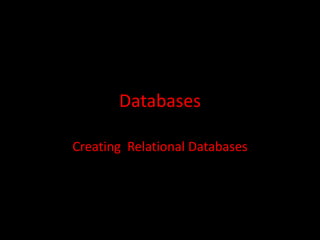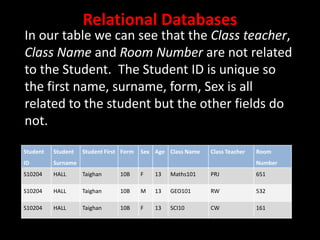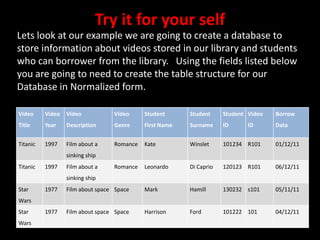Basic Relational Databases
- 2. School Database Student ID Student Student Form Sex Age Class Class Room Surname FirstName Name Teacher Number S10204 HALL Taighan 10B F 13 Maths101 PRJ 651 S10204 HALL Taighan 10B M 13 GEO101 RW 532 S10204 HALL Taighan 10B F 13 SCI10 CW 161 S10412 CRIST Graeme 10D M 14 GEO101 RW 532 S10412 CRIST Graeme 10D M 14 HIS101 HJD 541 S10101 ’üČ CRIST Graeme 10D M 14 Maths101 PRJ 651 S10414 HASLETT Oliver 10D M 14 Maths101 PRJ 651 S10101 FUNG JUNE 10A’üĘ F 15 Maths101 PRJ 651 S10101 FUNG JUNE 10B’üĘ F 15 GEO101 HJD 532 S10101 FUNF ’üĄ JUNE 10A F 15 HIS101 HJD 541 This is part of a database showing all students and their classes in a school.
- 3. Data integrity and Data Redundancy These issues can have a significant impact on the ability for a database to actually do the job that it is intended to do. Data Integrity is the idea that information always keeps its meaning. This is particularly difficult when databases get really big. If you imagine the database above includes every student and every class in the school it could contain over 10000 records.
- 4. School Database Student ID Student Student Form Sex Age Class Class Room Surname FirstName Name Teacher Number S10204 HALL Taighan 10B F 13 Maths101 PRJ 651 S10204 HALL Taighan 10B M 13 GEO101 RW 532 S10204 HALL Taighan 10B F 13 SCI10 CW 161 S10412 CRIST Graeme 10D M 14 GEO101 RW 532 S10412 CRIST Graeme 10D M 14 HIS101 HJD 541 S10101 ’üČ CRIST Graeme 10D M 14 Maths101 PRJ 651 S10414 HASLETT Oliver 10D M 14 Maths101 PRJ 651 S10101 FUNG JUNE 10A’üĘ F 15 Maths101 PRJ 651 S10101 FUNG JUNE 10B’üĘ F 15 GEO101 HJD 532 S10101 FUNF ’üĄ JUNE 10A F 15 HIS101 HJD 541 This is part of a database showing all students and their classes in a school.
- 5. Examples of Data integrity Examples of Data integrity ’üĄ A simple typo means that it might mean that information gets lost if we search for June in the data. This problem is much more likely because of the redundancies issues we will look at later.
- 6. School Database Student ID Student Student Form Sex Age Class Class Room Surname FirstName Name Teacher Number S10204 HALL Taighan 10B F 13 Maths101 PRJ 651 S10204 HALL Taighan 10B M 13 GEO101 RW 532 S10204 HALL Taighan 10B F 13 SCI10 CW 161 S10412 CRIST Graeme 10D M 14 GEO101 RW 532 S10412 CRIST Graeme 10D M 14 HIS101 HJD 541 S10101 ’üČ CRIST Graeme 10D M 14 Maths101 PRJ 651 S10414 HASLETT Oliver 10D M 14 Maths101 PRJ 651 S10101 FUNG JUNE 10A’üĘ F 15 Maths101 PRJ 651 S10101 FUNG JUNE 10B’üĘ F 15 GEO101 HJD 532 S10101 FUNF ’üĄ JUNE 10A F 15 HIS101 HJD 541 This is part of a database showing all students and their classes in a school.
- 7. Examples of Data integrity Examples of Data integrity ’üČ This example can cause real problems it shows that the same information in the database can mean two different things is s10101 Graeme or June.
- 8. School Database Student ID Student Student Form Sex Age Class Class Room Surname FirstName Name Teacher Number S10204 HALL Taighan 10B F 13 Maths101 PRJ 651 S10204 HALL Taighan 10B M 13 GEO101 RW 532 S10204 HALL Taighan 10B F 13 SCI10 CW 161 S10412 CRIST Graeme 10D M 14 GEO101 RW 532 S10412 CRIST Graeme 10D M 14 HIS101 HJD 541 S10101 ’üČ CRIST Graeme 10D M 14 Maths101 PRJ 651 S10414 HASLETT Oliver 10D M 14 Maths101 PRJ 651 S10101 FUNG JUNE 10A’üĘ F 15 Maths101 PRJ 651 S10101 FUNG JUNE 10B’üĘ F 15 GEO101 HJD 532 S10101 FUNF ’üĄ JUNE 10A F 15 HIS101 HJD 541 This is part of a database showing all students and their classes in a school.
- 9. Examples of Data integrity Examples of Data integrity ’üĘ Here we have June in two classes? Which one is right? What if we need to find June in registration urgently
- 10. Hard to find? They can be really hard to find in this Database there are more integrity errors can you find them?
- 11. Student ID Student Student Form Sex Age Class Class Room Surname FirstName Name Teacher Number S10204 HALL Taighan 10B F 13 Maths101 PRJ 651 S10204 HALL Taighan 10B M 13 GEO101 RW 532 S10204 HALL Taighan 10B F 13 SCI10 CW 161 S10412 CRIST Graeme 10D M 14 GEO101 RW 532 S10412 CRIST Graeme 10D M 14 HIS101 HJD 541 S10101 ’üČ CRIST Graeme 10D M 14 Maths101 PRJ 651 S10414 HASLETT Oliver 10D M 14 Maths101 PRJ 651 S10101 FUNG JUNE 10A’üĘ F 15 Maths101 PRJ 651 S10101 FUNG JUNE 10B’üĘ F 15 GEO101 HJD 532 S10101 FUNF ’üĄ JUNE 10A F 15 HIS101 HJD 541
- 12. Bad or unnecessary Fields Names Age is an example of a bad field name for the obvious reason that it can change at anytime. It would be much better to use DOB as age can always be calculated and ofcourse it does not change. Form may also be unnecessary in this case as the reference number is CODED to give the form. Can you explain the code?
- 13. Data Redundancy Data redundancy is the where data needs to be entered and stored on more than one occasion. For example if you look at the table you can see that we have entered Oliver HaslettŌĆÖs first name and surname every time we put him into a class. This can cause problems such as increasing the chance of someone entering his name wrong. It also means more time is needed to enter data and more space is needed when it is saved.
- 14. School Database Student ID Student Student Form Sex Age Class Class Room Surname FirstName Name Teacher Number S10204 HALL Taighan 10B F 13 Maths101 PRJ 651 S10204 HALL Taighan 10B M 13 GEO101 RW 532 S10204 HALL Taighan 10B F 13 SCI10 CW 161 S10412 CRIST Graeme 10D M 14 GEO101 RW 532 S10412 CRIST Graeme 10D M 14 HIS101 HJD 541 S10101 CRIST Graeme 10D M 14 Maths101 PRJ 651 S10414 HASLETT Oliver 10D M 14 Maths101 PRJ 651 S10101 FUNG JUNE 10A F 15 Maths101 PRJ 651 S10101 FUNG JUNE 10B F 15 GEO101 HJD 532 S10101 FUNF JUNE 10A F 15 HIS101 HJD 541 Table showing data redundancy .
- 15. Relational Databases The simple way to think about this is that when you create a table of data in a database you should have fields which directly relate to the key field of the table. Student Student Student First Form Sex Age Class Name Class Teacher Room ID Surname Number S10204 HALL Taighan 10B F 13 Maths101 PRJ 651 S10204 HALL Taighan 10B M 13 GEO101 RW 532 S10204 HALL Taighan 10B F 13 SCI10 CW 161
- 16. Relational Databases In our table we can see that the Class teacher, Class Name and Room Number are not related to the Student. The Student ID is unique so the first name, surname, form, Sex is all related to the student but the other fields do not. Student Student Student First Form Sex Age Class Name Class Teacher Room ID Surname Number S10204 HALL Taighan 10B F 13 Maths101 PRJ 651 S10204 HALL Taighan 10B M 13 GEO101 RW 532 S10204 HALL Taighan 10B F 13 SCI10 CW 161
- 17. Relational Databases We can now look at how to remove redundancy issues a process called normalization. This can be very complex and we are only going to look it is a simple way. Student Student Student First Form Sex Age Class Name Class Teacher Room ID Surname Number S10204 HALL Taighan 10B F 13 Maths101 PRJ 651 S10204 HALL Taighan 10B M 13 GEO101 RW 532 S10204 HALL Taighan 10B F 13 SCI10 CW 161
- 18. Removing Redundancy (ŌĆ£NormalizationŌĆØ) Instead of one single table we create 2 tables as shown below. CLASS STUDENT ClassID StudentID Class Name Student First Name Class Teacher Student Surname Room Number Student DOB Student Form
- 19. Removing Redundancy (ŌĆ£NormalizationŌĆØ) CLASS STUDENT ClassID StudentID Class Name Student First Name Class Teacher Student Surname Room Number Student DOB Student Form Unfortunately these tables have what is called a many to many relationship. That is there are many students in each class and there are many classes for each student. This kind of relationship will not work for what we need.
- 20. Step 2 To solve this problem we create an extra table which contains the StudentID and ClassID for each student in each class. What this does is remove the many to much relationship and replace it with a one to many or many to one relationship. That is one student can be in many classes and one class has many students. We can use the relationships to find the information we need in each case making use of something called Queries that we will look at later.
- 21. How it looks STUDENT CLASS StudentID ClassID FirstName Class Name Surname Class Teacher DOB Room Number Form STUDENTTAKES StudentID ClassID This goes a long way to solving our problem but there remains a potential problem with the room number field which could give use problems in what we want to do with the data. Why ?
- 22. STEP 3 (optional?) STUDENT CLASS StudentID ClassID FirstName STUDENTTAKES Class Name Surname StudentID Class Teacher DOB ClassID Room Number Form Room number is not actually related to the class. What happens if a class is in more than one room for example? If you were to do the normalization properly you would need to remove Room Number and create another table.
- 23. Entity Relationship Diagram This is called an Entity Relationship Diagram and they are used to show the data structure in a database. Student StudentTakes Class Room Class Room
- 24. Try it for your self Lets look at our example we are going to create a database to store information about videos stored in our library and students who can borrower from the library. Using the fields listed below you are going to need to create the table structure for our Database in Normalized form. Video Video Video Video Student Student Student Video Borrow Title Year Description Genre First Name Surname ID ID Data Titanic 1997 Film about a Romance Kate Winslet 101234 R101 01/12/11 sinking ship Titanic 1997 Film about a Romance Leonardo Di Caprio 120123 R101 06/12/11 sinking ship Star 1977 Film about space Space Mark Hamill 130232 s101 05/11/11 Wars Star 1977 Film about space Space Harrison Ford 101222 101 04/12/11 Wars
























